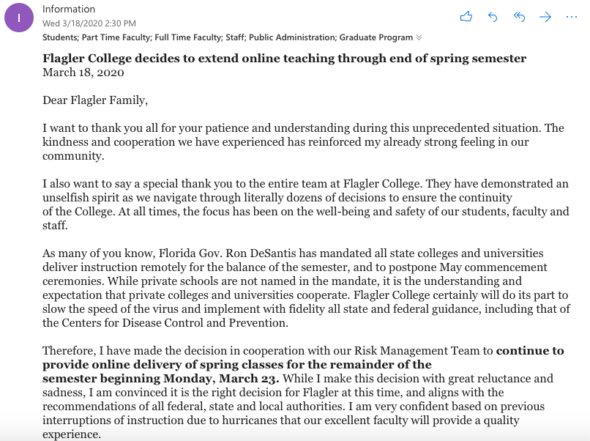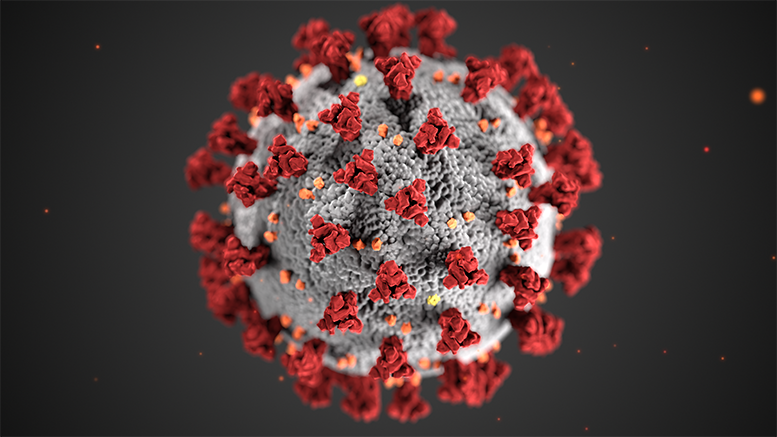By Jared Olson
As the deadly coronavirus pandemic sweeps into North Florida, with 82 known cases and 3 deaths in St. John’s and Duval Counties as of 11 A.M., Wednesday, Flagler College has declared that classes remain online for the rest of the semester. All college events for this spring and all study abroad trips for this summer have been cancelled. The May graduation commencement, further, has been delayed to December.
In a March 18 informational email sent to faculty, staff, and students, signed by Dr. Joyner, the school’s President wrote “I have made the decision in cooperation with our Risk Management Team to continue to provide online delivery of spring classes for the remainder of the semester beginning Monday, March 23.”

Dr. Joyner further wrote that “while our residence halls will remain open, students are encouraged, but not required, to stay home during this period.” The library and food services would remain open and available to students on a modified basis.
The coronavirus is “a pandemic of respiratory disease spreading from person-to-person caused by a novel (new) coronavirus,” according to the Centers for Disease Control.
Nearly 20,000 people have died worldwide from the virus as of Wednesday, according an ongoing study at John’s Hopkins University of Medicine. The same study said the total number of recorded infections was at 441,187. But medical experts are warning that a widespread lack of testing equipment could mean the actually numbers are far higher.
Students whose majors are dependent on hands-on learning activities have faced particular difficulties in continuing their studies.
“It’s affected the situation for a lot, especially as a communications student,” said TJ Badgujar, a fourth year student and contract photographer for the school. “I use all their equipment: the audio and camera gear, the IMAX Lab in the Cuna building. Those facilities aren’t available right now, so I’m not able to do much.”
In the course of his interview, Badgujar was shopping for supplies at St. Augustine Walmart on SR U.S. 1. He said the store was surprisingly well-stocked, in stark contrast to the empty shelves he’d witness two days prior.
“But everyone’s wearing gloves, masks. The whole deal,” he said.
“Still kind of crazy.”
Many students are food workers who’ve lost their jobs or been forced to seek other employment.
“I’m upset that I don’t get to finish college in class, mad that my last semester is over early,” said Chaize Riley, a fourth year Coastal Environmental Sciences major and server at the Columbia restaurant, in downtown St. Augustine.
Severe restrictions placed on food services by Governor Ron De Santis on March 17—including a total ban on bars and nightclubs for 30 days and a mandatory reduction of holding capacity by %50—means that Riley has, in effect, lost his source of income.
“Unless the government steps in to help restaurant workers, we’re going to be screwed for a while,” Riley said. He said that the college has done little to assist in helping students who’ve lost off-campus sources of income.
Many staff members have found working at home to be an unexpected challenge, but less problematic than they’d imagined it to be.
“Going online is kind of difficult for me,” said Dr. Rachel Cremona, an associate professor of social and behavioral sciences. “Because I don’t teach with PowerPoints. It’s through discussion. How do you do that online? That’s why I normally don’t teach online.”
Yet, in concert with many faculty members, she believes that Flagler has been sufficient in providing the infrastructure to make online school work for professors heretofore unaccustomed to it.
“The college has been really good giving us resources. Students are pretty well educated insofar as using the internet to get things done,” she said.
“Myself and everyone in the Institutional Advancement office are still plugging away,” said Sierra Aitken, the manager of Annual Giving at Flagler’s Institutional Advancement Office. “We have had to think on our feet to modify plans because of event cancellations and the need to change our messaging in light of the pandemic. I’m looking forward to coming out of this global mess a more organized and healthier person.”
“Luckily with the technology that we have, it’s not nearly as difficult as I thought it would be,” said Wendy Parrish, the administrative assistant for academic dean Dr. Vanden Houten. “I thought it wasn’t going to work, but thankfully we have the infrastructure at Flagler to be able to work smoothly at homes from our laptops.”
Tracey Eaton, an assistant professor in journalism and chair of the Communications Department, had been scheduled to teach in Beijing China through Flagler’s exchange program with China Foreign Affairs University. COVID-19 put a quick end to that by postponing the program.
“The coronavirus pandemic has created tremendous uncertainty about the future,” said Eaton. “It’s difficult to know when the crisis will subside. But I have been impressed with how quickly our faculty has adapted to teaching online. Students have also done a great job adjusting to this new reality.”
His responsibilities limited to his role as the Communications Department Chair, he says he has far more free time to brainstorm future journalism projects and collaborate with students on ideas of their own.
Many students have decided to go home to ride out the pandemic with their families. Others have decided to ride this out in St. Augustine.
“For me, the decision to stay was really easy,” said Ana Hall, a fourth year International Studies student. “I don’t want to Uber and go through airports and get myself exposed. But I’m very very comfortable with dealing with change.”



Be the first to comment on "Coronavirus sends Flagler College online"